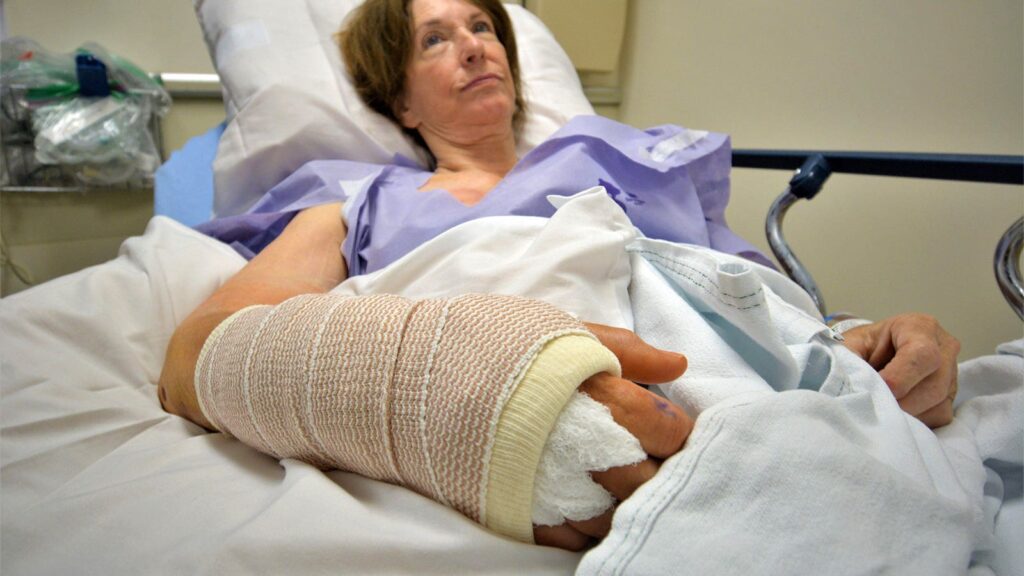- Nearly 11% of older adults with an injurious fall were diagnosed with dementia 1 year later.
- Compared with other traumatic injuries, falls were tied to a 21% increased risk of a subsequent dementia diagnosis.
- Findings support cognitive screening for older adults who have a fall that involves an ED visit or hospital admission.
A new diagnosis of Alzheimer’s disease or related dementia was more common after falls than after other traumatic injuries, an analysis of Medicare claims data showed.
The study assessed nearly 2.5 million older adults who had a traumatic injury that led to an emergency department (ED) visit or inpatient admission. About half (50.1%) were injured due to a fall.
Within 1 year, new dementia diagnoses were more common in people with falls than other injuries (10.6% vs 6.1%, P<0.001), reported Molly Jarman, PhD, MPH, of Brigham and Women’s Hospital in Boston, and co-authors.
After controlling for potential confounders and accounting for the competing risk of death, falling was tied to a 21% increased risk of a subsequent dementia diagnosis (HR 1.21, 95% CI 1.20-1.21, P<0.001), Jarman and co-authors wrote in JAMA Network Open.
The findings support cognitive screening for older adults who have a fall that involves an ED visit or hospital admission, the researchers said.
“The relationship between falls and dementia appears to be a two-way street,” Jarman noted.
“Cognitive decline can increase the likelihood of falls, but trauma from those falls may also accelerate dementia’s progression and make a diagnosis more likely down the line,” she said in a statement. “Thus, falls may be able to act as precursor events that can help us identify people who need further cognitive screening.”
Falls are a leading cause of injury among older adults, accounting for an estimated 3 million emergency department visits a year, according to the CDC. In 2020, 27.6% of older adults reported falling during the previous year. Specific recommendations for cognitive screening after a fall are inconsistent, the researchers noted.
“Implementing cognitive screening after falls will require a multidisciplinary effort involving the breadth of clinicians who care for older adults after a fall, ranging from trauma surgeons to geriatricians and primary care physicians,” Jarman and colleagues wrote. “Cognitive screening recommendations should be included in the American College of Surgeons Geriatric Trauma Best Practices Guidelines and other guidelines concerning the care of injured older adults.”
The researchers evaluated data about 2,453,655 older adults in Medicare fee-for-service records from 2014-2015, following them for 1 year after injury. Participants did not have a preexisting diagnosis of dementia. Findings were adjusted for patient demographics, medical comorbidities, and injury characteristics.
In the total sample, 62.1% were female, 91% were white, and the mean age was 78.1 years. More than one in five participants (21.9%) had been admitted to a skilled nursing facility in the prior year. About half (50.2%) had a Charlson Comorbidity Index of 1 or more.
Compared with those who had other traumatic injuries, people who fell were older (mean age 79.5 vs 76.7), more likely to be female (67.2% vs 56.9%), and more likely to be white (92.2% vs 89.8%; all P<0.001).
Participants who fell were more likely to have hip fracture surgery during their index admission (8.3% vs 1.4%, P<0.001). Rates of delirium during the index clinical encounter were low, but those who fell were more likely to be diagnosed with delirium than their counterparts (3.1% vs 1.8%, P<0.001).
In a subset of participants without a recent skilled nursing facility admission, falls were associated with a 27% increased hazard of new dementia diagnosis (HR 1.27, 95% CI 1.26-1.28, P<0.001).
Causality cannot be determined from this study, and relationships between falling and dementia may be bidirectional, Jarman and co-authors acknowledged. The sensitivity of identifying dementia diagnoses using Medicare claims is low, they added.
The researchers also did not have access to prescription data and could not control for potentially inappropriate medications that could raise the risk of falls or delirium.
-
Judy George covers neurology and neuroscience news for MedPage Today, writing about brain aging, Alzheimer’s, dementia, MS, rare diseases, epilepsy, autism, headache, stroke, Parkinson’s, ALS, concussion, CTE, sleep, pain, and more. Follow
Disclosures
This study was supported by the National Institute on Aging of the NIH.
Jarman reported grants from the National Institute on Minority Health and Health Disparities and the Department of Defense.
Co-authors reported grants from the NIH, honoraria for visiting professorships, support for attending meetings related to surgery and palliative care, and relationships with academic institutions.
Primary Source
JAMA Network Open
Source Reference: Ordoobadi AJ, et al “Risk of dementia diagnosis after injurious falls in older adults” JAMA Netw Open 2024; DOI: 10.1001/jamanetworkopen.2024.36606.
Please enable JavaScript to view the

